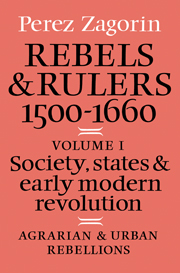Summary
Urban rebellion, extinct in the present world of centralized sovereign states, was a regular phenomenon in the former world of less centralized, weakly integrated, early modern states. Look into the well-known treatise, The greatness of cities, published in 1588 by the Piedmontese Giovanni Botero to explain the causes that make cities populous and rich. Few of the famous towns of Western Europe that Botero mentioned were immune to urban revolutions in their medieval past, the early modern era, or both. The rich towns of Flanders, most merchantable and frequented for traffic in all Europe because of their light custom duties; Paris, to which the Seine brings an incredible burden of shipping, a city exceeding all others in people and abundance of things; Florence, sovereign over a region of fertile plains and goodly valleys containing many towns and castles; Naples, Milan, and Ghent, formerly residences of princes but now ruled by the king of Spain; Palermo, also under Spain's rule, with its splendid churches and palaces, its lately built pier worthy even of the Romans, and its great new thoroughfare across the city, which has not its like for beauty in the rest of Italy; Spanish towns of honor and reputation – Toledo, Valladolid, Burgos, Barcelona, and Valencia – there was not one that did not at some time or another know the violence and passions of an urban revolt.
Shakespeare, among his innumerable images of life, offers us a picture of one sort of urban revolt that could be transposed to many towns.
- Type
- Chapter
- Information
- Rebels and Rulers, 1500–1600Society, States, and Early Modern Revolution, pp. 228 - 274Publisher: Cambridge University PressPrint publication year: 1982

